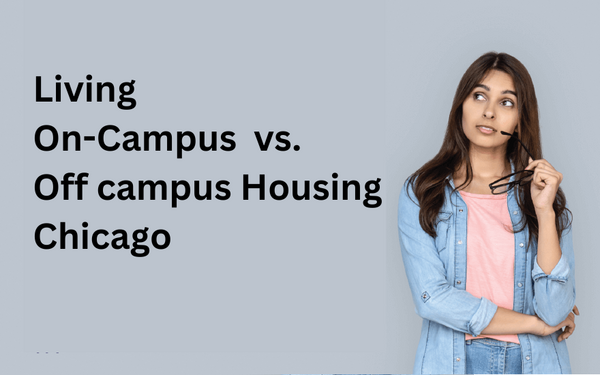For many students, studying at a university abroad in Chicago, USA, is their best choice. But there are many decisions to be made when considering studying abroad. One such choice that can be confusing for first-time international students is whether to live on-campus or off-campus. This article discusses the difference between living on and off campus and how that decision is made.
Choosing between on-campus and off-campus student housing in Chicago involves weighing several factors. On-campus housing offers convenience, with easy access to classes and campus facilities, as well as a built-in community and security.
However, it may come with less privacy and fewer amenities compared to off-campus options. Off-campus housing provides more independence, often larger living spaces, and the chance to explore the city. Yet, it can also bring challenges like longer commutes, added responsibilities like utilities and maintenance, and potential isolation from campus life. Ultimately, the best choice depends on personal preferences and priorities.
On campus accommodation
Student housing available on a university or college campus is called on-campus housing. It is usually administered by the university organization or another provider. The following are a few specific categories of on-campus Student Accommodation Chicago.
The Pros of On-Campus Housing
Convenience: Living on campus means that you spend all of your time on campus. Classes, on-campus activities, and facilities like the dining halls, gym, and libraries may all be reached by foot. Because of the close vicinity, you can snooze a bit longer before your 8 a.m. class.
Amenities & Facilities: Depending on the size of your college, living on campus may also get you access to extra amenities like student laundry rooms, gyms, and cafeterias.
Community: An essential component of any college experience is forming relationships and participating in the campus life. Living on campus puts you in close proximity to professors, support staff, and other students. It is simpler to look for possibilities to become engaged and form relationships when you live on campus.
The Cons of On-Campus Housing
Lack of Privacy: Living on campus means that you are always surrounded by other students, as was already noted. It’s possible that you’ll share a room and the public restrooms with a lot of other individuals. It may be difficult to get privacy or “me time” as a result, particularly if you’re an introvert or accustomed to your own space.
Regulations: Students living in dorms are required to abide by a number of stringent restrictions, which resident advisers make sure they do. These guidelines might cover things like curfews, what you can keep in your room, or whether or not it’s okay to have people of the other sex in your building. Students who are detected breaking these rules receive warnings from resident advisers or face fines.
Cost: If you live on campus, you will have to cover your housing and board. Many colleges charge students for a meal plan in addition to housing and board because they won’t have access to a private kitchen. The average projected cost of living on campus for the 2020–21 academic year, as reported by College Board, was $11,620 for public colleges and $13,120 for private colleges. Nonetheless, some universities let students utilise scholarships or financial help to pay for their living costs.
Off campus accommodation Chicago
Any accommodation that is outside the campus area and not provided by the institution is called off-campus housing and can be a variety of options for international students, including:
The Pros of Off-campus Accommodation
Freedom: With roommates, accessories, food and lifestyle choices, you will have plenty of privacy and flexibility to live your life the way you see fit. Additionally, you are exempt from rules and regulations that may apply to living on campus student accommodation Chicago.
Diversity: When you live alone, you are exposed to a wide variety of individuals, cultures, and experiences. In addition, it should be easy to see the city and its sights. You will meet people from different cultural backgrounds and thus will be able to explore and learn from them.
Cost: Depending on location and type of accommodation, it can be cheaper than staying on campus. You can prepare your own meals, get discounts and offers, and split rent and utilities with other tenants, making it easier to save money.
The Cons of Off-campus Accommodation
Transportation: If you live far from university campuses or public transportation hubs, it is more difficult to get to classes. In addition to dealing with traffic, bad weather, and safety issues, travel can be time-consuming and expensive.
Isolation: If you are a first-year student new to the state, you may feel isolated or withdrawn from your peers and students. Friendship, support, communication, and companionship may be scarce. In addition, you may encounter language and cultural barriers with landlords or neighbours.
Responsibility: Unlike living on campus, you are generally responsible for handling all matters yourself, including finding suitable accommodation, renting a room, settling debts, maintenance, cleaning, etc. You may have to deal with disagreements, maintenance, damage, or Froud.



